- Home
- Simon Kernick
Ultimatum Page 7
Ultimatum Read online
Page 7
‘It crossed my mind, yes.’
‘Check the bombmaker’s signature. It’ll be the same man who built the bombs used at the Stanhope. But the people involved will be covering their tracks. So whatever you or your bosses may think, I’m your best chance of finding them and building a case against them.’
‘And you do know who they are?’
‘Absolutely. These are the organizers, the ones providing the funds and the resources. But they stay a long way from the action. And they’re not finished yet.’
‘Are we talking about unfriendly Arab governments?’ asked Tina.
‘There was Arab involvement in the Stanhope operation,’ said Fox. ‘They wanted to pay the UK government back for interfering with Muslim affairs, and occupying Muslim lands. Iraq, Afghanistan, Libya. You name it, they were pissed off about it. But there was involvement within this country too. From people who, let’s say, were sympathetic with what the attacks on that day were trying to achieve. They’ve even got a name. They call themselves The Brotherhood.’
Tina wrote the name down. ‘And what are The Brotherhood trying to achieve?’
‘In their opinion, the UK’s lost its culture; it’s overcrowded; it’s being taken over by immigrants. A lot of citizens resent this, but the problem is they don’t resent it enough. They need something to push them over the edge. To get them so angry that they reach a point where they’ll vote for someone pushing a radical right-wing agenda. And the best way to achieve that is through terror attacks that can be blamed on immigrants and the children of immigrants. That’s what the Stanhope was about. I reckon that’s what the bombs today are about too. And there’ll be more to come because the more people die, the greater the effect.’
‘And were … are you a member of The Brotherhood?’
Fox smiled. ‘No comment.’
Tina eyed him closely, still surprised by how ordinary he looked, even though she knew that most killers look just like everyone else. ‘And do you have evidence against these people?’
‘More than you can imagine. And not just for Stanhope. For other crimes as well. And there’s one man at the top of the chain you’re going to be particularly interested in.’
‘How do you know about all this?’
Fox stared at her. ‘Because I used to work for him. If you can give me a guarantee that I’ll be sent to a secure, safe environment, and that I won’t serve more than ten years, then I’ll help you bring him and everyone involved to justice.’
‘You know as well as I do, Mr Garrett, that judges decide sentences in this country. Not politicians. And definitely not the police.’
‘But I also know there’s flexibility.’
‘There is. But it’s going to take time.’
‘We haven’t got time. That’s why I asked for you. There was an attempt on my life three days ago, just before the attacks today. That tells me, and it ought to tell you, that it wasn’t random. It was done for one reason and one reason only. To silence me. Like they silenced John Cheney. And they’re going to try again. Especially if they know I’ve been talking to you. You need to get me out of here, and fast.’
‘Give me a name. Something for me to go on.’
‘I need some guarantees.’
‘If your information’s good enough, I’ll get you out of here, I promise.’ Tina was lying, but she had to get something from this meeting in a claustrophobic little room with a brutal murderer. And she could tell from the renewed tension in his body language that he was thinking about it.
The room was silent.
Tina waited. Counting the seconds in her head.
‘Jetmir Brozi.’
‘He doesn’t sound much like a British neo-Nazi.’
‘He isn’t. But he’s involved.’
Tina wrote the name down. ‘In what way?’
But Fox was already getting up. She could tell that, as far as he was concerned, this meeting was over.
‘Look, a name’s no good to us on its own. I need something that shows you’re not bullshitting me.’
Fox ran his handcuffed hands through his hair, trying to avoid the bandage on his head, then winced and rubbed his injured arm. If the attempt on his life had been staged, it had been a damn authentic job. His eyes were cold as he looked at her, and for a moment Tina could imagine what it must have been like for the hostages on that frigid November night when they’d been staring down the barrel of his gun.
‘The weapons and explosives for the Stanhope siege came from Kosovo,’ he said at last. ‘The man who set up the deal from this end was Jetmir Brozi. He’s based in this country – a failed asylum seeker, if memory serves me correctly. He’s an Albanian with strong links to former members of the KLA – the Kosovo Liberation Army – who are still sitting on a lot of weaponry left over from the conflict. If the explosives used today are the same as at the Stanhope, Brozi will have been the broker.’
‘Where can we find him?’
‘He runs a brothel in an old warehouse near King’s Cross, or at least he did when I was dealing with him eighteen months ago. It’s on a place called Canal Street, about halfway down on the left if you’re heading north, and I think the name of the building is Mill House, although I couldn’t say for sure. I don’t know where he actually lives, but he’s known to the authorities under the name I’ve given you. He ran over a cyclist once, while driving without insurance or an MOT, and put the guy in hospital for six weeks with a fractured spine. It turned out that Brozi shouldn’t even have been in the country because he’d had his asylum application and two appeals turned down already. Even then they couldn’t get rid of him because, before the case got to court, he married a girl with a British passport and got her up the duff. Then he got his legal-aid-funded lawyers to say that separating him from his wife and child breached his right to a family life under the Human Rights Act. Hence, he’s still here.’ Fox couldn’t resist a cold smile. ‘It’s a great country we live in, isn’t it?’
Tina didn’t react as she wrote down the details, even though hearing stories about the weakness of the justice system and the vagaries of the Human Rights Act annoyed her as much as anyone.
‘I always made it my business to find out as much as I could about the people I did business with,’ continued Fox, ‘just in case it ever came in useful. Like now. Don’t waste what I know, Miss Boyd. Because if I die, my secrets go with me. And I have secrets that’ll make your hair stand on end.’
Tina replaced the notebook and got to her feet too. ‘I’ll be in touch,’ she told him, making no effort to shake hands.
‘You know, I admire you,’ said Fox, looking her up and down. ‘You might have caused us a lot of problems at the Stanhope, but I can’t help thinking that in other circumstances, we might have got on.’
‘Don’t flatter yourself,’ said Tina, turning away and signalling for the guard to let her out.
Fourteen
11.08
THERE ARE NO noble causes.
When I left the army, after twelve years’ service, I decided to become a cop. I’m still not entirely sure why. It just seemed like a good idea at the time. After my last tour of Helmand Province, I was sick of the military, and the way we were being hung out to dry out there. I wanted to try something different, something that didn’t involve sitting in an office all day or losing my legs to an IED, and being a cop seemed like it might be an interesting alternative.
It wasn’t.
I did three years in the Met, and I did a good job, no question. I put up with a lot of shit from the scum out there on the streets – and I tell you, there are one hell of a lot of them, people who know every last one of their rights, and think the world owes them a living. They didn’t have an ounce of respect, or fear, for the law or the uniform. The Human Rights Act put paid to all that. To them, we were just a joke. But I learned to turn the other cheek and get on with the job. I filled out all the pointless forms, followed the thousands of pedantic little rules, took the diversity courses, watche
d the senior officers fiddling the crime figures so they met their targets – never actually doing much in the way of fighting crime, but knowing that at the end of the day I was earning OK money and supporting my wife and daughter.
To alleviate the boredom, I applied to join CO19, the Met’s specialized firearms unit, and got in on the first attempt. And although I knew the chances of getting any real action were slim, I remember thinking that life was looking up for me.
Which was, of course, the moment it all went wrong.
It was just over a year ago, and I was part of a team who raided a shitheap of a property in Hackney where a couple of small-time crack dealers lived. We’d heard they kept a gun on the premises that was supposedly for protection – one they’d used in a mugging the previous year where some kid had got shot – as well as a pitbull. So we went in armed and mob-handed. We broke down the door, shot the dog – which was a pity because he had nothing to do with anything – then stormed through the place making a lot of noise, like you do when you’re an armed cop.
It was a real mess in there. There were overflowing rubbish bags and old takeaway cartons wherever you looked, dog shit on the floor, and an army of cockroaches lording it in the kitchen among all the grime-encrusted dishes. The whole house stank like the lions’ enclosure at a zoo. But that’s often par for the course in those types of places. As a cop, you learn fast that it’s not just the law that the criminal classes have no respect for. Most of the time they don’t respect themselves either.
I was one of the first upstairs, and that’s where I found her. She was fifteen years old, a runaway from a local care home, and she was tied to a stinking mattress in the back bedroom, semi-conscious and out of her head on God knows what. She was stark naked, with friction burns round her ankles and wrists where she’d struggled to break free. I had no idea how long she’d been there for, but she’d peed and crapped herself, and when the doctor examined her afterwards he said she was massively dehydrated, so it must have been a fair while. They’d been using her for sex. Just fucking her and, from what we could work out, charging other men to fuck her. Apparently she owed them money for dope, hadn’t paid up, and this was her punishment. They got her wrecked, then held her prisoner. Threatened to burn her alive if she ever told anyone.
Most right-thinking members of the public have no idea this kind of thing goes on, often only within walking distance from their front doors. But it does. It’s happening all the time.
We never knew how many men had raped her. These days, thanks to CSI and all those other programmes, the bastards are all forensically aware, so they used condoms and made sure they didn’t leave any of them behind for us to find. The girl herself wasn’t sure. She’d been too wrecked to know what was going on most of the time, but she’d suffered some pretty major injuries, so we knew it was a good few of them, and they hadn’t been gentle.
The problem was, when we raided the place only one of the two dealers was there. He was a cocky little sod, name of Alfonse Webber. Only eighteen and already a career criminal. He said he didn’t know anything about the girl, and blamed his friend, the other dealer. But when we tracked down the other dealer, he denied everything as well. We tried to get the girl to talk but she was scared stiff; all she wanted was to be left alone. And you couldn’t blame her. She had to live round there.
So that was that. What could we do? To top it all, we only found a few rocks of crack in there, and no gun. Webber went to court and got a suspended sentence. He claimed the gear was for his own use, and that he didn’t have a clue how the girl had got herself tied up in the bedroom. The judge didn’t believe him – at least I hope he didn’t; sometimes it’s hard to tell. But the prisons are full, and there wasn’t enough evidence to convict him of anything major. So he got a suspended sentence, and walked.
To be honest, what happened with Webber was no worse than a dozen other incidents I’d had to deal with, but the thing was, it acted like the culmination of all those other incidents. I’d had enough. When he came strutting out of the court with his lawyer, the little bastard saw me and laughed – this braying, mocking noise like a donkey. Even now, I remember perfectly the rage that went through me. It was so intense it actually made me start shaking. Then he started bragging in this ridiculous street patois about how the Feds would always be too stupid to get one over him – that sort of thing. His lawyer, this nerdy little bald guy with glasses, tried to get him to stop, and the cop I was with, well, he could see the effect it was having on me, so he put a hand on my shoulder and told me just to ignore it.
I almost managed to as well. I started to turn away, to think about something else.
And then he said it. The one thing that was always going to tip me over the edge. He said that he was looking forward to fucking my daughter some day soon.
My beautiful little daughter, who was three years old.
I snapped. The strange thing was that, as he said it, the vision that came into my head wasn’t of my daughter. It was of a young squaddie called Max, who got hit by an IED in Helmand on my first tour there. He was ripped to shreds, left with half an arm and no legs, and he ended up stuck in a council flat ignored by the army and the government and the council and everyone, while this piece of shit – this dirty fucking piece of shit who’d never done a day’s work in his life, who’d never done anything to help anyone else ever – got to deal crack, torture young women, and threaten police officers, all with total impunity.
So I went for him. Hard. His lawyer tried to stop me but I broke the slimy bastard’s nose with one punch. Webber was off like a shot, but his jeans were hanging halfway down his arse and he was wearing these huge trainers that looked like they weighed more than him, so he was never going to get away. I jumped on his back and drove him face first into the pavement. I had his head in my hands and I kept slamming it down on the concrete. The blood was splattering everywhere. Jesus, it was a sweet feeling. I would have killed him, no question. It never even occurred to me to stop. I would have smashed his head into pieces and stamped on the remains, but thankfully I never got the chance. There were a lot of people in the vicinity, including cops and security guards, and eventually they managed to pull me off him. But I was still lashing out. One of the court security guards got an elbow in the face that knocked out two of his teeth, and the cop I was with ended up with a busted cheekbone.
I was arrested on the spot. There was no way of avoiding it really. Alfonse Webber was hurt pretty bad. He was in hospital for a week and had to have extensive plastic surgery to repair the damage to his face. I was suspended immediately and charged with grievous bodily harm. When I appeared in court two days later, I was remanded in custody. Even though it was my first offence, even though I was a decorated war hero, even though a psychiatrist who interviewed me subsequently concluded I was suffering from post-traumatic stress disorder, even though Alfonse Webber was a violent lowlife who’d gone out of his way to provoke me … Even after all those things I was looking at a three- or four-year stretch minimum.
And then someone offered me a deal.
*
We drove through the back streets of north London, passing through Edmonton and then Enfield, and all the time Cecil kept checking his rearview mirror to make sure we weren’t being followed – although I had no idea who might be following us. If it was the cops, they would have arrested us on the spot, seeing that Cecil had just killed a man. But I kept quiet and let him get on with it.
The continuous swathes of clogged-up London suburbs eventually gave way to identikit executive housing communities, golf courses, and the first hints of the green belt, and then when we were only just the other side of the M25, Cecil pulled into a quiet country lane and stopped twenty yards short of an abandoned-looking barn nestling on the edge of a small beech wood.
‘This is a bit of an out-of-the-way place to meet someone, isn’t it?’ I said, looking round.
‘You can never be too careful,’ said Cecil, reaching over and pulling a mob
ile phone-shaped electronic device with an antenna on the end from the glove compartment. When he switched it on, a red light appeared on the side.
‘What the hell’s that?’ I asked, knowing full well what it was.
‘It’s a bug finder. If you’re wearing a wire, it’ll pick it up.’
‘It might have escaped your notice, Cecil, but we’ve just committed an armed robbery together, so I’m hardly likely to be setting you up.’
‘The man we’re meeting’s paranoid. And orders are orders.’
I let him do the honours, knowing there was no point arguing. The machine didn’t beep.
‘You want to search me as well?’
Credit to Cecil, at least he had the dignity to look embarrassed as he got out of the car after grabbing the holdall with the money from the back seat. ‘Come on.’
I followed him up the track towards the barn. The air was cold and fresh, and the sun was just managing to fight its way through the cloud cover. The constant stream of traffic from the M25 was no longer audible, and the only sound among the trees, and the fields beyond them, was the occasional shriek of a crow. There were no other cars around, which meant that the man we’d come to see hadn’t arrived yet, or he was keeping a very low profile.
It struck me then that this would be an ideal place to kill someone.
We stopped outside the barn. One side of it was open to the elements and it was empty inside bar a cluster of rusty oil drums and some ancient farm machinery.
‘Where’s the guy we’re here to meet?’ I asked, rubbing my hands together against the cold.
‘Here,’ came a voice behind us.
I turned round and saw a figure in a long coat emerge from the outbuilding behind us, from where he’d clearly been watching our approach, and walk over to us. Even though he was dressed casually, he was wearing an expensive-looking pair of leather driving gloves.
‘Sir, this is Jones, the man I was telling you about.’ Although he tried to hide it, Cecil’s tone was deferential.

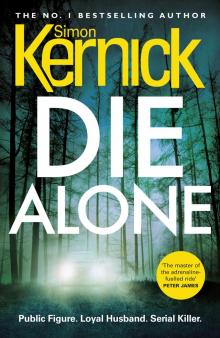 Die Alone
Die Alone Deadline
Deadline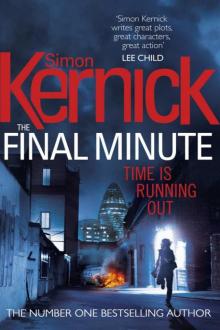 The Final Minute
The Final Minute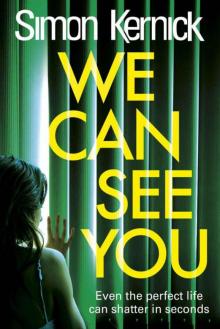 We Can See You
We Can See You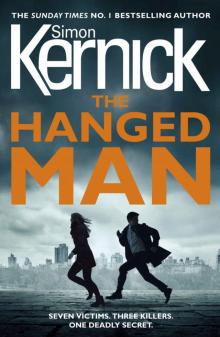 The Hanged Man (Bone Field 2)
The Hanged Man (Bone Field 2)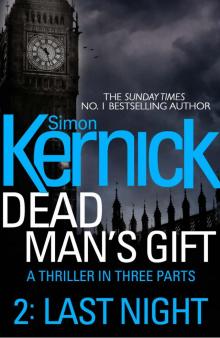 Dead Man's Gift 02 - Last Night
Dead Man's Gift 02 - Last Night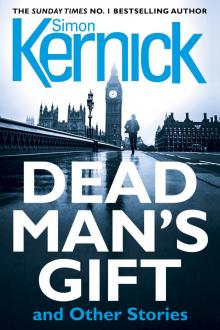 Dead Man's Gift and Other Stories
Dead Man's Gift and Other Stories A Good Day To Die
A Good Day To Die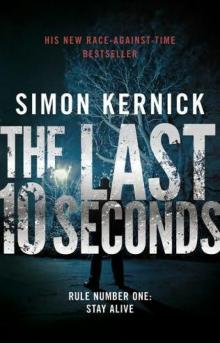 The Last 10 Seconds
The Last 10 Seconds The Murder Exchange
The Murder Exchange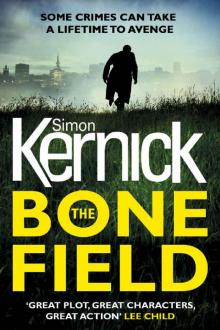 The Bone Field
The Bone Field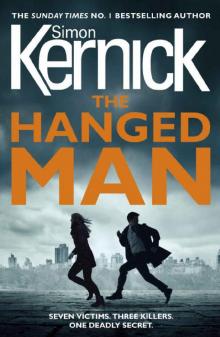 The Hanged Man
The Hanged Man Target
Target The Last 10 Seconds: A Novel
The Last 10 Seconds: A Novel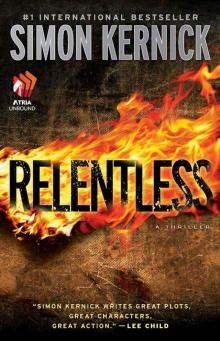 Relentless: A Novel
Relentless: A Novel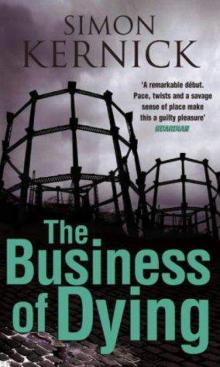 The Business Of Dying
The Business Of Dying Die Twice
Die Twice Flytrap
Flytrap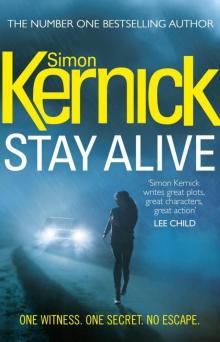 Stay Alive
Stay Alive Dead Man's Gift 03 - Today
Dead Man's Gift 03 - Today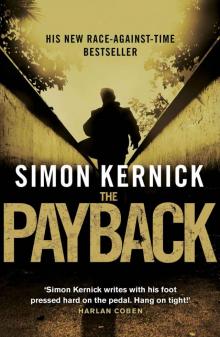 The Payback
The Payback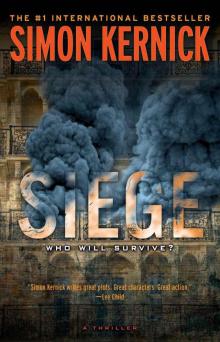 Siege: A Thriller
Siege: A Thriller The Crime Trade
The Crime Trade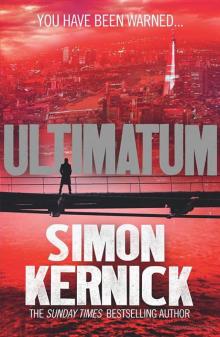 Ultimatum
Ultimatum